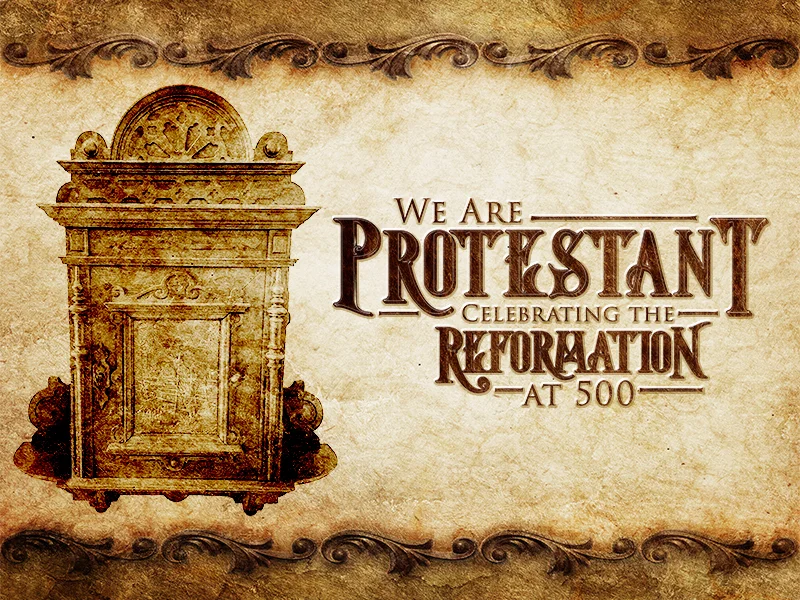What is the greatest theme of the Bible? Some might say love is the greatest. Love is not the greatest. Paul says in 1 Corinthians 13, Now faith, hope, and love, remain, and the greatest of THESE is love. Out of faith, hope, and love, the greatest is love. But there is a theme that is motivated by love that I believe takes the spot as the greatest theme of the Bible – Grace, Grace, God’s grace, Grace that will pardon and cleanse within; Grace, grace, God’s grace, Grace that is greater than all our sin.
Let's look at that wonderful five letter word that makes all the difference – grace. What do we mean when we say grace alone?
Grace alone means that salvation from beginning to end is solely a work of God.
I like the way that Carl Trueman puts it. He says "Grace is the heart of the Christian gospel. It is a doctrine that touches the very depths of human existence because it not only reveals to us the very heart of God but draws us back into that precious communion with him that was so tragically lost at the fall." (Grace Alone, 19)
Grace is so amazing. It is unbelievable that God would lovingly and freely choose to favor us. Grace is everything for us. Grace means that God chose us before creation. By the grace of God Christ went to the Cross to die for us. God’s grace saves us, seals us, and sets us apart for himself.
It’s amazing to me that when we talk about grace in such tremendous terms, people want to take the amazingness out of grace. There is nothing more overwhelming than grace. Today, let’s put amazing back into grace.
Nothing is more encouraging than grace. Grace tells us that God has sought us and made us his very own. We were lost, depraved, darkened, but God came after us. We were unlovable, but God loved us. And, here is the amazing part of grace, before God created dust he knew you and loved you. The Psalmist knew this and delighted in God’s free choice to love when he said,
Your eyes saw my unformed substance;
in your book were written, every one of them,
the days that were formed for me,
when as yet there was none of them. (Psalm 139:16)
Do you see the comfort this gives? To know that when you go out at night and look at the stars that God not only knows how many are there, but he put them all there. The One who told the stars to shine in the night sky knows your name. He has always known your name. There is no greater comfort for us than grace.
This is why Peter begins his letter with grace. Let's look at 1 Peter 1:3-5 and learn of God's Amazing Grace.
There are many places to go to teach the doctrine of Grace alone, but I want to do my best to show you how these truths arise from the text.
1. Grace is a Gift of God
As we said, 3-12 is one long sentence in Greek. In verse 3, Peter begins with the theme of the entire paragraph. We bless God because of the salvation that he has given to us. Highlight the phrase given to us in your minds. Grace is a gift of God. Look at the language of the text.
God has caused us to be born again. Salvation is all of God. If you are saved it means that you are the recipient of God’s grace.
Let’s think about this phrase for just a minute. First off, why do we use a term like saved? I had a friend of mine at college who used to wonder why we used terms like “saved.” What does the term salvation imply? It implies what Peter says here. We were dead and in need of life. Can you think of a greater need for a dead person other than life? Can a person do anything until he has life? Who has the power to give life? The same One who raised Jesus from the dead. This is why we use the term saved – the greatest need we have is life. We need to be saved from death, and the only way to be saved from death is to have life. And the way to have life is through God’s direct intervention. The language the Bible uses to refer to his direct intervention - He causes us to be born again.
There’s another one of those phrases – born again. Jesus reintroduced this phrase to Nicodemus. In John 3, Nicodemus, a Pharisee came to Jesus by night and had a conversation. Jesus told him, Unless one is born again he cannot see the kingdom of God. Nicodemus thought he was referring to natural birth, entering the womb a second time. He came at it like a Pharisee, he wanted to know what he had to do and how he could do it. Listen to how he responds to Jesus in John 3:4 “How can a man be born when he is old? Can he enter a second time into his mother's womb and be born?” But listen to Jesus, reply. “Truly, truly, I say to you, unless one is born of water and the Spirit, he cannot enter the kingdom of God. That which is born of the flesh is flesh, and that which is born of the Spirit is spirit. Do not marvel that I said to you, ‘You must be born again.’ The wind blows where it wishes, and you hear its sound, but you do not know where it comes from or where it goes. So it is with everyone who is born of the Spirit.” (John 3:4-8)
Do you see what Jesus did? He grounded being born again in the miraculous gift of God, not in the work of man. Salvation is all of God. This language is not something new. As Jesus and Nicodemus continue to talk Nicodemus doesn’t get it. Nicodemus said to him, “How can these things be?” Jesus answered him, “Are you the teacher of Israel and yet you do not understand these things? (John 3:9-10) This language of new birth is the hope of the Old Testament. Ezekiel, Jeremiah, the Psalms, all hope for the day when God will come and do a new thing in the hearts of his people. Peter looks at his audience who are troubled by so many things and tells them that they are the recipients of this new birth.
The language of birth to describe salvation is perfect. And here is where the mystery comes and so many of us aren’t willing to delight in the mystery. But God wants us to be amazed by grace, to have our jaws drop and be left speechless. Let me ask you a question. Did you have anything to do with your birth? Did you come consult your Mom and Dad and say, I want to be born at this time, and in this place, and with these circumstances, and by the way can you name me this? You can’t take any credit for being born, and you can’t take any credit for being born again. I know that some like to think that they can, but you can’t.
Why is it so important for us to emphasize this? We emphasize this so that God gets the glory. God is the author of our salvation. Did you hear that? God is the author of our salvation. Yes, salvation is for us, but salvation was not by us. We aren’t bystanders in salvation, we are the recipients of salvation, and the giver of the gift gets all the glory. HE gets all the glory, but look at what he gives – grace. And by grace, we are saved.
Augustine said it like this:
"To praise you is the desire of man, a little piece of your creation. You stir man to take pleasure in praising you, because you have made us for yourself, and our heart is restless until it rests in you."
I know, many of us have questions – even angels have questions, look what Peter says in verse 12. But instead of coming with questions, questions, let’s focus on what we know. We know that grace is a gift of God. Look at what that means.
2. Through Grace, God Gives Us All Things
Grace is both the gift and avenue His gifts come to us. Grace is the language that God has given us to encompass this amazing fact that we who were undeserving have received what we didn’t deserve. There are two things there. 1) The fact that we receive anything and 2) The what we receive. It’s all on account of grace. It’s all so that we can say praise God. It’s all so that he gets all the glory.
There are three terms that are often found in company together in Scripture: Grace, Mercy, and Peace. They are here in Peter. We’ll have to go back to the last part of verse 2 to see them. Chuck Swindoll said this about each of them. “Grace is God’s gift to the worthless; mercy is God’s ministry to the helpless, and peace is God’s love to the restless.” Peter chose these terms on purpose. He is writing to a group of believers who through their circumstances haven’t been allowed to become too comfortable. They know they are strangers and sojourners in the world. They are pilgrims making progress to the celestial city. He doesn’t want them to be captivated by hopelessness; he wants them to be amazed by grace.
We have a life that has been given to us and an inheritance that is kept and unspoiled. I like the way that Eugene Peterson in his paraphrase The Message puts it:
I, Peter, am an apostle on assignment by Jesus, the Messiah, writing to exiles scattered to the four winds. Not one is missing, not one forgotten. God, the Father, has his eye on each of you and has determined by the work of the Spirit to keep you obedient through the sacrifice of Jesus. May everything good from God be yours!
What a God we have! And how fortunate we are to have him, this Father of our Master Jesus! Because Jesus was raised from the dead, we’ve been given a brand-new life and have everything to live for, including a future in heaven—and the future starts now! God is keeping careful watch over us and the future. The Day is coming when you’ll have it all—life healed and whole.
See how these verses end. These verses end by reminding us now of our future hope. We have this hope to carry us along the way. All grounded in God’s amazing grace. Look at verse 5. God’s power saves us from beginning all the way to the end and everywhere in-between. With this grace that carries us through life, how is it that we live? We live this grace by faith, but that takes us too far for this time. We will leave faith for next week. For now, we will delight in Grace, grace, God’s grace, Grace that is greater than all our sin!

